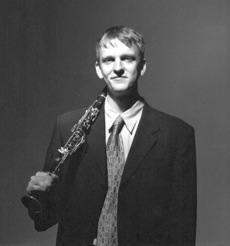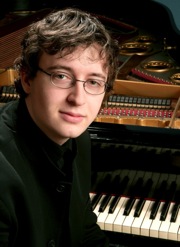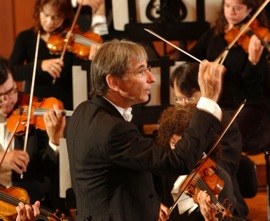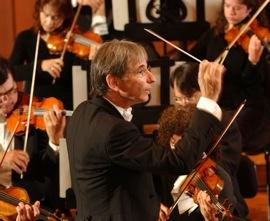Michael Tilson Thomas and the San Francisco Symphony have a long history of successful and seemingly idiomatic performances of French music, and thus Saturday’s program, advertised as “French Classics,” looked both appealing and promising. Alas, that promise was not wholly fulfilled until the second half of the concert.

Photo by John Perry
The first half could best be described as fitful, and full of classics it was not. On one hand, the orchestra gave a stunning performance of Debussy’s brief Première Rapsodie for Clarinet and Orchestra, with principal clarinetist Carey Bell playing the solo. The Rapsodie, written in 1911, is prime Debussy, diaphanously and colorfully scored, its elusive harmonies shifting constantly under the listener. The solo clarinet rises up from the orchestra, sometimes dancing around it or floating above it. While there’s more clarinet heard than any other solo instrument, it never attempts to dominate or compete with the orchestra. Bell magically projected his tone so that it enveloped the audience, seeming to come from all sides while clearly originating from a single point on stage. The orchestral sonorities of the piece had their own magic.
On the other hand, there was the opening Rapsodie espagnole, by Ravel, a popular showpiece played with noise and precision yet little flair or charm, rarely sounding either Spanish or French. That’s at least half the composer’s fault, but I’ve certainly heard this orchestra and conductor play slight music with considerably more élan. On this occasion, they sounded as uninterested and let’s-get-this-over-with as I’ve ever heard them.

Then there was Debussy’s Fantaisie for Piano and Orchestra, an early work bearing almost no resemblance to what we think of as the composer’s mature style, with the young French pianist Jean-Frédéric Neuburger soloing. Yes, there were portents of the Debussy to come: in a big English horn solo, played beautifully by Russ deLuna, in a striking passage with only the basses and winds, and in a puckish moment that reminded me of “Fêtes,” from Debussy’s Nocturnes. There were also plenty of looks into the past. What to make, for example, of that oddly Wagnerian brass fanfare at the otherwise indecisive end of the first movement? And what of the outright chromaticism toward the end of the last movement?
The piano part, too, is neither fish nor fowl; it’s not a typical concerto part, but neither does it seem much of a fantasy. It certainly gives the pianist a good workout, with runs and arpeggios galore. Neuburger, making his SFS debut, played neatly, with clear tone and clean articulation, though it’s hard to get much of a sense of his artistic personality and preferences based on one hearing of this rarity. He’s been doing well in competitions for the last few years and is building his career, so perhaps he’ll be back in the area with a solo recital.
On Solid Ground

What a relief it was, after the intermission, to be back in the land of the undisputed masterpiece, as orchestra and conductor stepped up for a brilliant, and brilliantly dramatic, performance of three scenes from Berlioz’ “dramatic symphony,” Roméo et Juliette.
Even without chorus or soloists, it’s easy to follow the plot with the hints provided by the section titles, so vividly does Berlioz portray the action of the play. No human actor could match the nobility and depth of the brass during the “Intervention of the Prince” in the introductory scene, nor could a lovesick Roméo go on at such length in “Romeo Alone” without maddening the audience — but Berlioz’ orchestra can do these things, and more. The “Love Scene,” the central movement in these excerpts, might as well have been sung by the orchestra, and sounded as urgent and tenderly rhapsodic as could be. Berlioz’ orchestration brought more marvels, in the audaciously drawn-out unisons of the third movement and in the startling accents played by paired timpani and tambourine during the festivities.
MTT and the orchestra could do no wrong, performing this idiosyncratically structured music with such balance and clarity of intention that, paradoxically, it sounded Beethovenian. Would that they’d played the entire work, as they were scheduled to do last year, and kept just the Première Rapsodie from the program’s first half.

